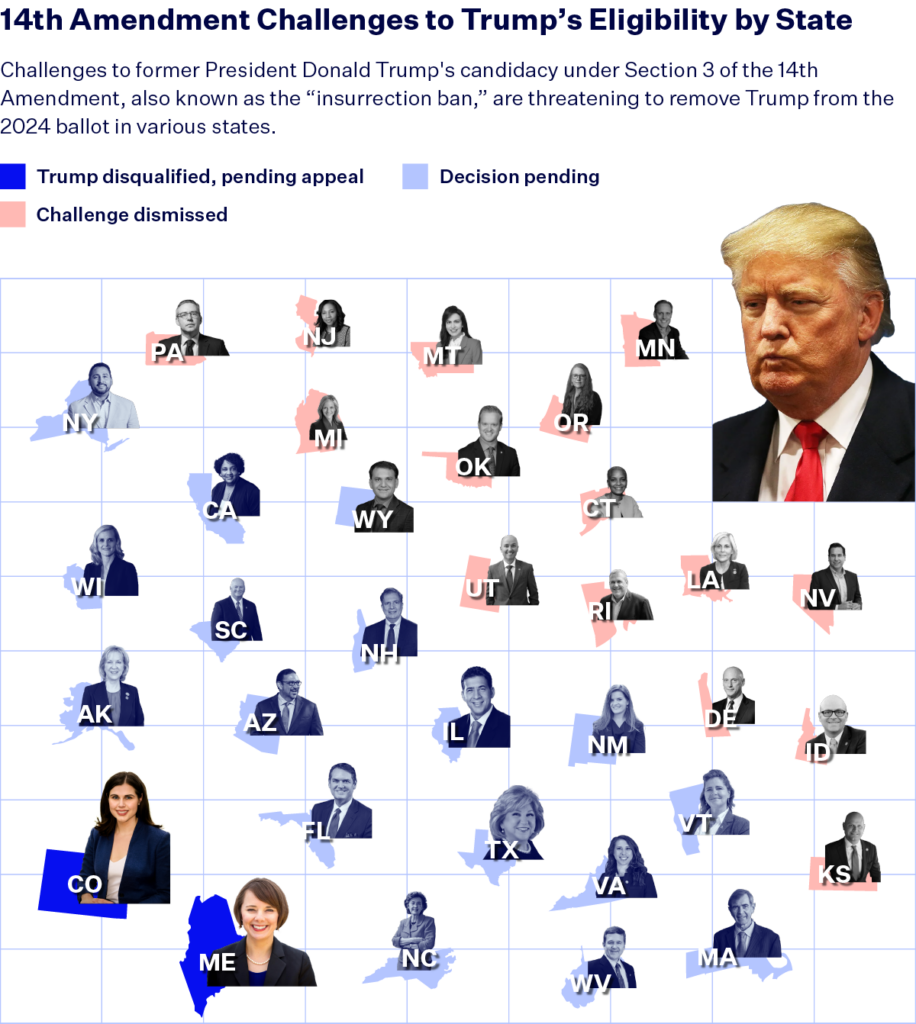In recent months, lawsuits across the country have been filed using a Reconstruction-era amendment to challenge former President Donald Trump’s constitutional eligibility to once again become president, given his role in the Jan. 6, 2021 insurrection on the U.S. Capitol.
Section 3 of the 14th Amendment prohibits the election or appointment of an individual to state or federal office if they previously held such an office, took an oath of office and then “engaged in insurrection or rebellion against the [United States], or given aid or comfort to the enemies thereof.”
Trump is currently facing 19 challenges to his eligibility under Section 3 of the 14th Amendment. The majority of challenges to Trump’s eligibility have thus far been unsuccessful, as seen in states like Michigan and Minnesota.

However, Trump has been ruled ineligible for the presidency in Colorado by the state’s Supreme Court, and Maine Secretary of State Shenna Bellows (D) similarly ruled Trump to be ineligible in on the Maine primary ballot, though both decisions are paused until the U.S. Supreme Court rules on Trump’s eligibility.
The Colorado case has made its way to the U.S. Supreme Court, which could settle the issue once and for all. Oral argument in the case is scheduled for Thursday, Feb. 8.
Here you can find all of our coverage on the challenges to Trump’s eligibility, a detailed explanation of the “insurrection ban” outlined in the 14th Amendment, opinion pieces from Marc and guest authors and more.
Cases Challenging Trump’s Eligibility
Colorado Trump 14th Amendment Ballot Disqualification Challenge
A Colorado judge had originally ruled that although Trump had engaged in an insurrection, Section 3 did not apply to the presidency. Following an appeal, the Colorado Supreme Court held that Trump had engaged in an insurrection and that Section 3 was applicable, barring him from the primary ballot pending a decision from the Supreme Court. After Trump appealed to the nation’s highest court, the justices agreed to take up the case and are holding oral argument on Feb. 8.
Maine Trump 14th Amendment Ballot Disqualification Challenge
The initial decision over Trump’s eligibility in Maine was at the hand of Secretary of State Shenna Bellows (D), who deemed Trump ineligible for the presidency under Section 3 and disqualified him from the primary ballot. Trump subsequently filed a lawsuit challenging the ruling, and the decision has since been paused by a state judge pending a decision by the U.S. Supreme Court in Trump’s Colorado case.
What is the insurrection ban and how does it apply to Trump?
Section 3 of the 14th Amendment prohibits the election or appointment of an individual to state or federal office if they previously held such an office, took an oath of office and then “engaged in insurrection or rebellion against the [United States], or given aid or comfort to the enemies thereof.” Learn more here and here.
Lawsuits seeking to kick Trump off the ballot have faced three main substantive questions:
- Was Trump an officer of the U.S.? Lawyers for the former president have claimed the term applies to appointees, and therefore are inapplicable to the presidency.
- Is the presidential oath of office taken during Inauguration Day an acceptable oath as prescribed by Section 3?
- Did Trump’s actions on and surrounding Jan. 6, 2021 meet the standard of engaging in an insurrection?
In a recent episode of our podcast Defending Democracy, Marc and Paige discuss these questions, what these lawsuits are arguing and when a decision might come on the issue.
The Latest updates
Additional Reading
How Should SCOTUS Apply Section 3 of the 14th Amendment? Amicus Briefs in Trump’s Disqualification Case Have Different Answers
We analyze briefs amicus briefs submitted in Trump's Colorado 14th Amendment disqualification appeal, which will be heard by the U.S. Supreme Court on Feb. 8.
The Justices Must Choose: Trump or the Constitution
There really is no way for the Court to protect Trump and defend the U.S. Constitution — it must choose and bear the consequences.